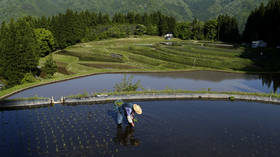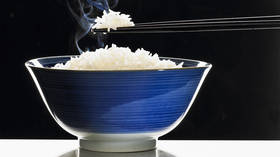Japan’s farmers to switch from rice to wheat – media

Japanese farmers plan to reduce rice production and partially switch to planting wheat and soybeans at home, Japan Today reported on Monday, citing a survey by the Ministry of Agriculture, Forestry and Fisheries.
The move comes as global prices have spiked since February's launch of Russia’s military operation in Ukraine and subsequent Western sanctions on Moscow. The situation threatens a shortage of supplies in Japan.
According to the report, 37 of the country’s 47 prefectures said they planned to reduce the areas where they cultivate rice in favor of other crops.
Japan's rice consumption has been declining since 1962, the publication notes, attributing the trend to changes in eating habits and a dwindling population. Meanwhile, demand for wheat and soy remains strong. However, Japan imports 80% of the wheat and 90% of the soybeans it consumes, and the prices of these commodities globally have risen sharply since the start of the crisis in Ukraine, which has jeopardized the availability of both Russian and Ukrainian grain supplies. The two countries are traditionally considered the globe’s breadbasket, previously ranking as first and fifth respectively among the world’s major exporters of wheat.
Japan’s agriculture ministry estimates the total planting area for rice will decrease by 35,000 hectares but recommends a further 4,000 hectares be cut in order to bring production down to the level of demand at around 6.75 million tons annually. The freed-up acreage will be used to plant wheat and soy, as well as rice for animal fodder.
Major global organizations, including the UN and WTO, have repeatedly warned of an impending food crisis due to a shortage of grain brought about by the conflict in Ukraine. The West has been accusing Russia of preventing Ukrainian grain exports from leaving port, while Moscow has denied the allegations, stating that export problems are the result of actions by Kiev’s army and anti-Russia sanctions. The WTO estimates that between 22 million and 25 million tons of grain are currently held up at Ukraine’s ports, creating a shortfall in global supplies. WTO chief Ngozi Okonjo-Iweala on Sunday said that the UN was in constant talks with Russia, Ukraine and the EU on ways to help resume these exports.
For more stories on economy & finance visit RT's business section














